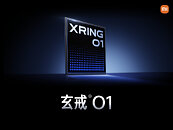Xiaomi XRING 01 SoC Die Shot Analyzed by Chinese Tech YouTuber
Three weeks ago, Kurnal and Geekerwan dived deep into Nintendo's alleged Switch 2 chipset. The very brave Chinese leakers are notorious for their acquiring of pre-release and early silicon samples. Last week, their collective attention turned to a brand-new Xiaomi mobile chip: the XRING 01. After months of insider murmurs and official teasers, the smartphone giant recently unveiled its proprietary flagship SoC. According to industry moles, Xiaomi has invested a lot of manpower into a special chip design entity—leadership likely wants to avoid a repeat of prior first-party developed disappointments. Despite rumors of disappointing prototype performance figures, mid-May Geekbench results pointed to the emergent XRING 01 mobile chip being up there with Qualcomm's dominant Snapdragon 8 Elite platform. Die shot analysis has confirmed Xiaomi's selection of a TSMC 3 nm "N3E" node process; also utilized by the latest Apple, Qualcomm and MediaTek flagships. Overall die size is 114.48 mm² (10.8 x 10.6 mm), with 109.5 mm² of used area; comparable to Apple's A18 Pro SoC footprint (refer to Geekerwan's comparison shot, below).
Unlike nearby rivals, the XRING 01 seems to not sport an integrated 5G modem. Notebookcheck surmised: "it is rumored to use an external radio from MediaTek. It isn't located on the actual die itself, and likely a contributing factor to why its size is so small." Annotations indicate the presence of off-the-shelf/licensed Arm CPU cores (ten in total): two Cortex-X925 units, four Cortex-A725 units, two Cortex-A725 units, and two Cortex-A520 units. Additionally, an Arm Immortalis-G925 MP16 iGPU was identified. A 6-core NPU—with 16 MB of cache—was highlighted, but it is not clear whether this is a proprietary effort or something bought in. Observers have noted the absence of SLC cache. GSMArena posited: "the Geekerwan team speculates that (Xiaomi's) omission of the SLC has hurt GPU efficiency—it's pretty fast, but it uses more power than the Dimensity GPU at peak performance. The more efficient CPU combined with the fact that the GPU rarely runs at full tilt makes for pretty good overall efficiency in real-life gaming tests." The XRING department's debut product is impressive, but industry watchdogs are looking forward to refined variants or full-fledged successors.
Unlike nearby rivals, the XRING 01 seems to not sport an integrated 5G modem. Notebookcheck surmised: "it is rumored to use an external radio from MediaTek. It isn't located on the actual die itself, and likely a contributing factor to why its size is so small." Annotations indicate the presence of off-the-shelf/licensed Arm CPU cores (ten in total): two Cortex-X925 units, four Cortex-A725 units, two Cortex-A725 units, and two Cortex-A520 units. Additionally, an Arm Immortalis-G925 MP16 iGPU was identified. A 6-core NPU—with 16 MB of cache—was highlighted, but it is not clear whether this is a proprietary effort or something bought in. Observers have noted the absence of SLC cache. GSMArena posited: "the Geekerwan team speculates that (Xiaomi's) omission of the SLC has hurt GPU efficiency—it's pretty fast, but it uses more power than the Dimensity GPU at peak performance. The more efficient CPU combined with the fact that the GPU rarely runs at full tilt makes for pretty good overall efficiency in real-life gaming tests." The XRING department's debut product is impressive, but industry watchdogs are looking forward to refined variants or full-fledged successors.































































































